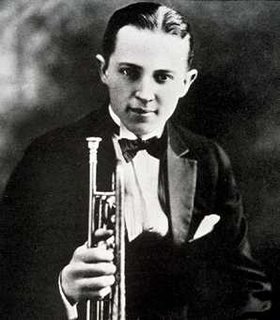Bix

Bix Biederbecke was born on this day in 1903 in Davenport, Iowa.
The "first great white jazz musician," as described by James Lincoln Collier, Leon Bismarck Beiderbecke learned piano by ear as a child, and though he received nominal encouragement from his parents, they certainly never envisioned for him a career in music. At 15, Beiderbecke fell in love with records by the Original Dixieland Jazz Band, a white jazz band from New Orleans, and began to copy the cornet lines from the records, developing his embouchure and fingering through trial and error.
His parents, concerned about his flagging scholastic performance and obsession with this odd music, sent him to a boarding school in Chicago. There he had an entire city full of nightclubs to choose from, and received an ample education in the latest jazz currents as well as in drinking heavily. Before one year was over, he was expelled from the academy, and at 19 he plunged headlong into a musical career.
He began to play in a traveling jazz group called the Wolverines, mostly at school dances and in clubs in Ohio and Indiana, and recorded with them in 1924. The records were mildly successful, mainly due to Beiderbecke's handsome playing -- with a warm, seductive, bell-like tone and perfectly controlled vibrato. At 21 Beiderbecke was recognized as an important jazz cornetist, his solos feeling their influence among budding white jazz musicians and commanding the respect of African-American musicians as well.
Late in 1924, he teamed up with Frankie Trumbauer, a first-rate C-melody saxophonist; "Bix and Tram," first with Jean Goldkette's band and later with Paul Whiteman, became a sensation on college campuses and recordings. Influenced by classical music, especially Edward MacDowell, Frederick Delius, Maurice Ravel and Claude Debussy, Beiderbecke evidenced a natural feel for harmonic approaches, and could effectively solo over 32 bars without sticking closely to the melody. He departed from the ground beat far less than other major jazz artists of the period, but he made up for his rhythmic conservatism with his dazzingly original sense of structure and expressiveness -- evidenced in such masterworks as "I'm Comin' Virginia" and "Singin' the Blues." Louis Armstrong, Benny Goodman and Hoagy Carmichael, among others, were admirers of his playing.
By 1929, however, his drinking began to take its toll on his health, and Whiteman sent him home to Davenport (to his unappreciative family) to rest in a sanitarium. Returning to New York, he began to drink again, and died in a boarding house, suffering from pneumonia and delirium tremens. Beiderbecke's life story was distorted in Dorothy Baker's novel Young Man with a Horn (1938; made into a film in 1950 with Kirk Douglas) -- his downfall was simply alcohol, not a lack of appreciation by fellow musicians or the listening public.
Labels: Jazz





0 Comments:
Post a Comment
Subscribe to Post Comments [Atom]
<< Home